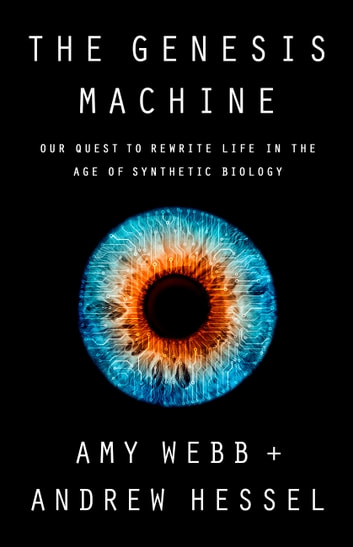Join celebrated biotechnologists Amy Webb and Andrew Hessel for a discussion of co-authored book, “The Genesis Machine: Our Quest to Rewrite Life in the Age of Synthetic Biology.”
VIRTUAL EVENT DETAILS
Friday February 25, 2022 12:00 PM ET
Harvard Book Store
Get Tickets: https://www.harvard.com/event/virtual_event_amy_webb_and_andrew_hessel/
About the Authors:
Amy Bloom is the author of Come to Me, a National Book Award finalist; A Blind Man Can See How Much I Love You, nominated for the National Book Critics Circle Award; Love Invents Us; Normal; Away, a New York Times bestseller; Where the God of Love Hangs Out; and Lucky Us, a New York Times bestseller. Her stories have appeared in The Best American Short Stories, O. Henry Prize Short Stories, The Scribner Anthology of Contemporary Short Fiction, and many other anthologies here and abroad. She has written for The New Yorker, The New York Times Magazine, The Atlantic Monthly, Vogue, O: The Oprah Magazine, Slate, Tin House, and Salon, among other publications, and has won a National Magazine Award. She is the Shapiro-Silverberg Professor of Creative Writing at Wesleyan University.
Andrew Hessel is a microbiologist and geneticist who has worked on the leading edge of genomics, bioinformatics, and synthetic biology. He is the CEO of Humane Genomics Inc., a seed-stage company developing virus-based therapies for cancer, starting with dogs. He is a co-founder of the Genome Project-write, the international scientific effort working to engineer large genomes, including the human genome. From 2012-2017 Andrew was the Distinguished Researcher at Autodesk Life Sciences. He has been Singularity University faculty since 2009. His goal is to help people better understand and use living systems to meet the needs of society.

About the Book:
The breakthrough science of synthetic biology and its potential for helping solve humanity’s existential challenges, from climate change to the health and feeding of millions, and fighting the next viral outbreak before it becomes a global pandemic.
Synthetic biology is the promising and controversial technology platform that combines biology and artificial intelligence, opening up the potential to program biological systems much as we program computers.
Synthetic biology enables us not just to read and edit DNA – the technique of CRISPR – but also write it. Rather than life being “a beautiful game of chance”, synthetic biology creates the potential to control our genetic destiny, to say “no” to bad genes and build a veritable genetic app store for downloading and adding new capabilities into any cell, microbe, plant, or animal.
Amy Webb and Andrew Hessel’s riveting stories include: the work of scientists to develop plants that can be grown in sprawling indoor farms capable of feeding millions with a fraction of the usual resources required; a synthetic, self-regulating insulin that doesn’t require injections or a pump; life-altering regenerative, personalized medicine; and novel, durable solutions to climate change. There is also whimsy, such as the dream of some geneticists to “unextinct” the wooly mammoth.
By examining both the science and the ethical, moral, and religious issues surrounding synthetic biology, Webb and Hessel provide the background for preventing its misuse by some to reengineer their bodies and that of their children, further increasing the disturbing division and polarization of societies into the haves (the enhanced) and the have nots. They provide the background for making wise decisions about issues such as: whether to program novel viruses to fight diseases, what genetic privacy will look like, who will “own” living organisms, how companies should earn revenue from engineered cells, and how to contain a synthetic organism in a lab.
Whether we approve or disapprove of synthetic biology, it is coming. Now, we need to understand its promise and peril. Webb and Hessel help us understand the science as well as the political and societal issues involved.














